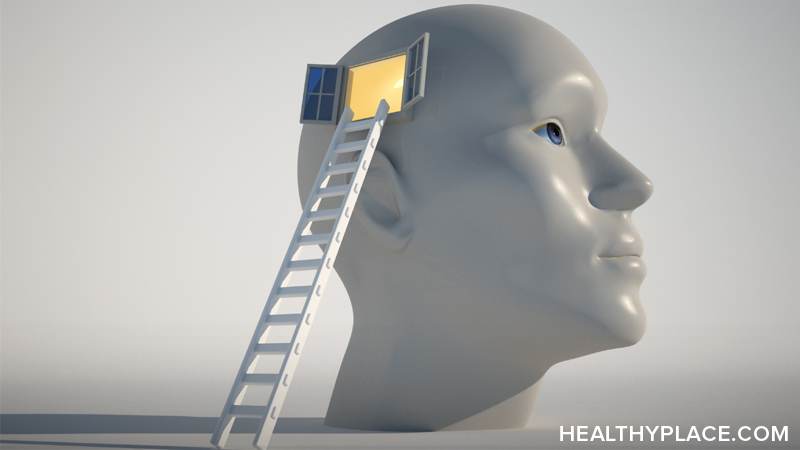The Reality Construction Kit

Reality is something you make. The objective of psychotherapy is to help you construct a new reality.
And so I come to the most important part of this article. If you take nothing else away from what I have written, take this. This is important whether or not you're mentally ill. I think we would all be better off if more people understood the following:
Reality is not something that just happens to you.
Reality is something you make.
Most people never question the reality they experience. Most people are fortunate to have no reason to ever question it; their reality works well for them. The people who have reason to give up their reality are usually forced into it, either because they are insane, or because life just doesn't work for them. There is no satisfying measurable definition of sanity or insanity; instead, some people have a reality that works for them, and some people don't. Some people might be satisfied with their reality but society might not be satisfied with the behavior their reality causes them to exhibit, and so we sometimes commit the mentally ill involuntarily to mental hospitals.
Even if you don't feel the need to question your reality or make a new one, I assert it is worthwhile for you to understand this in the event you ever have to, or ever need to try to help someone make a new livable world for themselves. At the very least, it will help you to understand why some people are so difficult to get along with and help you relate to them. It's not simply that some people hold different opinions, it's that many people, not just the insane, live in a completely different world from the one you experience.
There is an objective reality, but we cannot experience it directly. It is also without significance or meaning. The reality we experience is drawn from the objective reality but sliced, diced, julienned and pureed by the food processor of our bodies, cultures and minds.
This is a very old idea. But I first came to understand it when I took a course at UCSC called Anthropology of Religion, taught by Professor Stuart Schlegel. Among other things Dr. Schlegel discussed the cosmologies of various cultures, and how they created their worlds. He explained this in a theoretical framework first advanced by the philosopher Immanuel Kant.
Kant referred to objective reality as noumenal reality. Noumenal reality is everything that exists, in all its detail and complexity. It is too vast and complex to experience, and much of it is out of reach of our senses because it is too large, too small, too far away, lost in noise or detectable only with frequencies of light or sound we cannot perceive.
Noumenal reality is also without meaning - it is uninterpreted, because in noumenal reality there is no one to interpret it. From Physics I know that all that exists are subatomic particles interacting in incomprehensible numbers and complex ways. The division of our world into spaces and objects is a fiction created by our minds - in the noumenal world there are no objects, just a continuity of space punctuated by infinitesimal particles.
There is no past and future in noumenal reality. There is time. But the only things that exist, exist now. What once was doesn't exist anymore and what is yet to come does not yet exist.
Kant called what we actually experience subjective reality. It is created from noumenal reality first through a process of selection and then interpretation.
We can only see the wavelengths of light our eyes can detect, hear the frequencies of sounds our ears will accept, and understand a limited amount of complexity. Complexity is managed through a process of that combines and simplifies the raw material of noumenal reality into the subjective reality of the objects we perceive. We then apply interpretation to the objects based on our culture and our personalities. There is only so much we can pay attention to or even notice at all. In a very real sense we only see or hear what we want to, although the decision might be made at a very primitive level in our brains. Some sights or sounds are scary and capture our attention because during evolution those of our ancestors who gave significance to such experiences survived to reproduce.
Importantly, many of the selections and interpretations involve choices, although unconscious ones, that are influenced first by our biology, then our culture, then our personality. And the salvation of the mentally ill is that although the choices are made automatically at first, we can make new choices. I'm not saying it's easy, but one can influence one's reality over time and eventually establish new patterns of automatic choices that can result in a reality that is much happier to live in than, say, the world of fear and despair I used to inhabit.
Constructing a New Reality Through Therapy
The objective of psychotherapy is not to provide you with a professional friend to listen to your tales of woe. It is to help you construct a new reality. While you can expect your therapist to be sympathetic when you are in crisis, a good therapist also challenges her client to question their assumptions. Therapy is hard because the answers to such questions are often painful to face.
Everyone who starts therapy hopes to get back to the good old days before they began to suffer, but that's not what therapy will do for them. Instead therapy helps you to let go of those of your beliefs, even your most cherished beliefs, that led you astray. In the end a successful therapy client may be very different than they ever were before, but if the therapist does her work well the client will ultimately be more truly themselves than they ever have been in their lives.
Therapy alone is enough to treat the neurotic individual. But as I said there is a biological component to the construction of reality. Despite all that therapy has done to help me, my brain is unable to regulate its chemistry on its own. That is why I must take medication. If I didn't, the power of my chemical imbalances would overwhelm me. Someone with a mental illness whose roots come from biology must take medicine.
But someone with a biological mental illness must have both kinds of treatment - only rarely if ever does one suffer this illness without developing a neurosis. That's why I feel it is irresponsible for general practitioners to prescribe psychiatric medicine without referring the patient to a psychiatrist or psychotherapist. Giving someone only medicine at best gives them temporary relief from their symptoms without them ever developing the insight they really need to take control of their lives.
So you can see that it is a great benefit that we construct our realities. But it can be terrible too. In Anthropology of Religion, Dr. Schlegel also discussed millenarian movements, that is the phenomenon of people believing the end of the world was at hand.
A Dangerous Mind
Sometimes a person comes along who has the dangerous combination of being both delusional and charismatic. While of course charisma comes naturally for some people, I feel it can also arise as an unusual symptom of mental illness. After all, if manic depressives can experience euphoria as a symptom, cannot the terrible neediness of the paranoid drive them to whatever lengths it takes to attract followers? These people become cult leaders.
One of the other factors in creating a cult is for the group to become isolated. The isolation contributes to the cult members losing their grip on reality. There really is no such thing as "normal" in society - at best there is only what is average, or commonly experienced by most people. If someone strays too far from the mean, their interactions with others will tend to correct them. The lack of that correction is what causes the isolation that many of the mentally ill experience to make them sicker. When a group gets isolated, that's how a charismatic but delusional leader can bend the minds of otherwise healthy people.
I was moved to write my first web page about my illness shortly after the Heaven's Gate mass suicide. When I heard about it I just freaked out and spent a couple of weeks in a seriously troubled state of mind. It was the worst off I'd been in a long time.
It wasn't simply that the incident vividly reminded me of the times I had been suicidal. It was that it made me question the very foundations of my reality. The people who "shed their vehicles" with the aid of barbiturates to go join the extraterrestrial visitors were not depressed, in fact the videotapes they left behind showed them to be apparently happy and healthy people, and intelligent ones too: the cult operated a successful web design firm! What upset me was the realization that despite my best efforts to maintain a firm grounding in reality, I knew that even perfectly sane people could be fooled into killing themselves quite enthusiastically. I knew that I could be fooled too, if I wasn't careful.
This can happen to entire nations. If international and economic conditions lay the right foundation, a single delusional and charismatic leader can incite a whole country to become a murderous cult. In For Your Own Good: Hidden Cruelty in Child-Rearing and the Roots of Violence Alice Miller discussed the violent abuse Adolf Hitler's father subjected him to as a child and how that led to his adulthood as the pathologically violent leader of Nazi Germany.
Such pathology, while too horrible for most people to contemplate, is an expected consequence of the reaction of normal human nature to extreme circumstances. Lest you think it's not worth your concern, I want you to consider for a moment the following: If it can happen to Heaven's Gate, if it can happen in Jonestown, if it can happen in Waco, if it can happen to Cambodia, if it can happen even to a large, populous, powerful, modern and industrialized nation like Germany, then it can happen here.
next: Why I Publicly Admitted I Have Schizoaffective Disorder
APA Reference
Staff, H.
(2007, March 6). The Reality Construction Kit, HealthyPlace. Retrieved
on 2026, January 19 from https://www.healthyplace.com/thought-disorders/living-with-schizoaffective-disorder/reality-construction-kit



